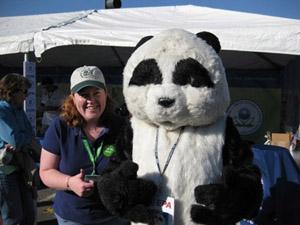Meet EPA Scientist Maureen R. Gwinn, M.S. Ph.D. DABT

Making a Difference in Public Health
EPA biologist Dr. Maureen Gwinn has been with EPA's Office of Research and Development since 2006. Dr. Gwinn currently serves as the Director of the Biomolecular and Computational Toxicology Division (BCTD) in the Center for Computational Toxicology and Exposure (CCTE).
Dr. Gwinn earned her BS degree in Biology at Bates College in Lewiston, Maine and her MS and PhD in Oral Biology at the State University of New York, Buffalo. She is a Diplomate of the American Board of Toxicology and a Fellow of the Academy of Toxicological Sciences.
Along with a passion for science outreach, Maureen also makes jewelry in her spare time and travels home to Maine as often as possible.
How does your science matter?
The Agency relies on new approach methodologies (NAMs; any technology, methodology, approach, or combination that can provide information on chemical hazard and risk assessment avoiding the use of intact animals) to advance our actions on chemical assessment. The science in BCTD focuses on developing and BCTD’s mission is to support the Agency activities in this area by expanding and refining the development and use of high-throughput assays, complex cell culture systems, alternative species models, and computational and informatics approaches to transform the components of chemical risk assessment with a focus on human health. This science matters because what we do in BCTD will help us to understand potential effects of chemical exposure quicker and with less resources so that we can inform more chemical hazard assessments and therefore increase our ability to protect public health.
If you could have dinner with any female scientist, past or present, who would it be and what would you want to ask them?
I would never have thought of that question! But I have to say Marie Curie, who won the Nobel Prize for physics in 1903. I remember I did a book report on her in the 6th grade. It was fascinating! She went through so much to do her job and to do a job that women did not usually do back then.
The safety measures we take now are so different from what they did in her time. They did not know then that it would be so dangerous to work with radioactive materials, but she thought it might be and she did it anyway. I would like to ask her if she had thought about the health risks of her work. If she had known of how dangerous the work would be, would she have still done it? I would like to think that she would.
When did you first know you wanted to pursue science?
When I was in 6th grade, I was already intrigued by science, and soon I realized that in science you could make a difference. There are other things you can do with my degree, but I like making a difference in public health. One thing I like most about my work at EPA is that I feel like my contribution to protecting public health is more direct.
If you were not a scientist, what would you be doing?
Probably something in event planning. I love animals and have worked with them in the past (I was a professional dog-walker in graduate school). I used to do a lot of fundraising work in West Virginia to raise money to start a no-kill animal shelter. Again, I wanted to make a difference in an issue I cared about, and used my organizational skills (and my bossy attitude) to help.
Any advice for students considering a career in science?
Make sure you absolutely love whatever area you are going into. Spending time getting your doctoral degree in a field that you do not love will be miserable. And of course, always keep an open mind! I started out in dental research and here I am working in risk assessment. It is okay to move around and try new things, even if you have to go back a few steps. If you love it, it is worth it.
Editor's Note: The opinions expressed herein are those of the researcher alone. EPA does not endorse the opinions or positions expressed.
